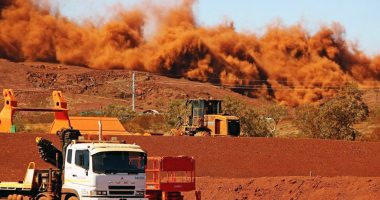- Mining king BHP (BHP) continues to put its money on the table for an emission reduced future
- On Monday, the company announced a US$15 million (around A$19.6 million) partnership with major customer and steelmaker HBIS Group
- Over three years, BHP and the Chinese company will research and study technologies to reduce greenhouse gas emissions
- This is the third deal BHP has signed in a year that pledges money to further fund renewable energies and reduce carbon impacts
- BHP is seeking to become a net-zero-emission company by 2050
- Shares in BHP are up a slight 0.43 per cent during Tuesday’s session to $49.59
Australian mining giant BHP (BHP) continues to hedge its bets on a green future — now striking a deal with a Chinese company to help reduce carbon emissions.
On Monday afternoon, the Aussie company signed a memorandum of understanding with Chinese steelmaker HBIS Group.
HBIS, which is a big customer of BHP iron ore, will help fund US$15 million (around A$19.6 million) over three years to build for a greener future. Together, the two companies will study technologies to reduce greenhouse gas emissions.
According to a BHP media release, the partnership will focus on three key topics: hydrogen-based direct reduction technology, recycling steelmaking slag, and directly reducing emissions during iron and steel production.
China has previously declared its plans to become carbon neutral by 2060. Historically, Australia has pivoted financially off coal exports — a carbon-heavy fossil fuel.
Although Australia remains dependent on coal exports, BHP Chief Executive Mike Henry inferred that our country has a role to play.
“Global decarbonisation will require collaboration and collective effort, and our work with partners such as HBIS Group will build on our own actions and help reduce emissions right through the value chain,” he said.
“BHP has a long and trusted relationship with HBIS Group, and we are pleased to establish this strategic partnership to explore new ways to reduce emissions from steelmaking”.
In November of last year, BHP signed a similar scheme with steel producer China Baowu — and again later in February this year with the Japanese company JFE Steel.
“We view decarbonisation of the steel industry as a complex puzzle that requires multiple technological solutions across the value chain over different time horizons,” said BHP Chief Commercial Officer, Vandita Pant.
The times they are a-changin’
Appealing to renewable energy can be much like a balancing act for prominent companies such as BHP. On one hand, they represent a vital financial role in our economy by exporting coal and metals.
On the other, they play a role in how our country is represented — a paradigm of image and political pressure.
After Joe Biden was elected as the latest United States President, he has made his support for renewable energy shown. U.S. Diplomat John Kerry made this clear at a climate summit this year.
“Countries must phase out coal five times more quickly than the current rate, increase tree cover five times more quickly, accelerate renewable energy deployment six times more quickly and transition to electric vehicles 22 times more quickly,” he said.
This puts Australia in an interesting position. As the rest of the world may dial back on its profiting coal, we stand there to supply a third of China’s coal needs alone.
How companies such as BHP handle this transition into the future, with many buyers relying on us, will be an interesting show to watch. However, BHP doesn’t seem to show much hesitation.
Last month, the Australian company announced a US$1.6 billion (approximately A$2.09 billion) write-down on the value of two of its thermal coal mines.
In abandoning such emission-heavy fossil fuels, the company will direct its focus to copper, nickel, and iron ore.
BHP is even aiming to become a net-zero-emissions company by 2050. Last year, Mike Henry committed to a 30 per cent reduction in carbon emissions over the next decade alone.
But for every green energy research deal or write down in thermal coal projects, the company continues to use coking coal, oil, and gas resources with no signs of slowing.
Shares in BHP are up a slight 0.43 per cent during Tuesday’s session to $49.59 at 10:29 am AEDT.





